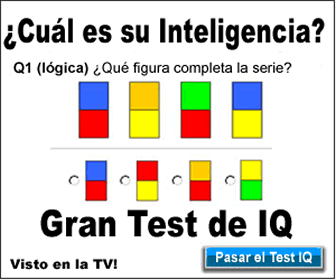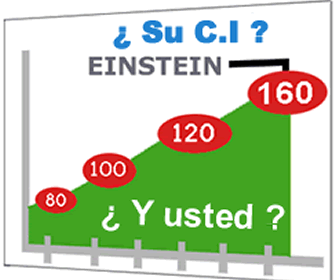What is intelligence and How can it be measured?
Defining intelligence is highly problematic. Is there an 'intelligence' that equips us to solve all kinds of problems and answer all questions, regardless of their nature? Or are there different intelligences that help us deal with particular problems and solutions? The scientific community is divided on the issue.
1- Measuring Intelligence
What's IQ - IQ tests
There are a number of different methods which purport to measure intelligence, the most famous of which is perhaps the IQ, or 'Intelligence Quotient' test. The 'Stanford-Binet Intelligence Scale' began life in early 20th century Paris, as part of Alfred Binet’s efforts to educate children with learning difficulties. Those that obtained a score below their age were considered "retarded".
IQ is a 'psychometric' test, meaning it measures mental ability. However, defining intelligence is far from simple. There are two main schools of thought. The first believes in an inherited, genetically determined intellect that can be measured. The second group of psychologists believe in many intelligences, the development of which may be the result of our social background. They also think that measuring these intelligences is also problematic.
The modern day IQ test measures a variety of different types of ability such as verbal, mathematical, spatial, memory and reasoning. The test is then 'pre-tested' on a group of people representative of the wider population. Then it's graded so that the majority of people will be get between 90-110.
When graphed, this is a curve in the classic 'bell' shape where most people are distributed around the average intelligence (or intelligence score) and few people are at the extreme ends of low and high intelligence. Graph showing intelligence of population:

Celebrity IQ: Clever celebrities
The following famous people have a high IQ -
Sir Jimmy Savile; journalist Garry Bushell; sci-fi writer Isaac Asimov; actress Geena Davis; MP Vincent Cable; footballers Andy Harris and Joey Beauchamp; TV presenters Carol Vordeman and Jamie Theakston; biologist Dr Jack Cohen; boxer Nicky Piper and swimmer Adrian Moorhouse. See also: All famous IQ: Einstein, Paris Hilton...
Is IQ a good measure of intelligence?
Whether IQ tests actually test general intelligence, or g, is debatable. Many see IQ tests as an assessment of an individual’s problem solving ability rather than general intelligence. However, they are not even a comprehensive test of someone's problem solving ability. Although they may assess analytical and verbal aptitude well, they aren't an accurate test of creativity, practical knowledge, and other skills involved in problem solving. So how can IQ tests be seen as a measure of intelligence? Some argue that they just show how good the individual is at IQ tests!
Alternative brain tests
- Elementary cognitive tasks
These aim to link the psychological and physiological aspects of intelligence and determine the speed at which the brain works. They test responses to stimuli and involve tasks that become progressively more complicated. Researchers claim that there is a correlation between results from these and IQ tests.
- Visual illusions
'Psychophysics' is the the physical study of psychological phenomena: how information from the senses is understood. Most research revolves around measuring people's ability to perform a visual task, then seeing how the brain reacts to that task. Visual illusions are particularly good for studying this area as illusions question our perception. Image: Gameboy

Is our intelligence changing?
In an attempt to avoid a slant that favours a particular culture, intelligence tests were devised that focused on mathematical and spatial skills rather than vocabulary. But even these tests are not exempt from cultural influences - increased use of video games improves spatial awareness and reaction time. However, although we are gaining skills in some areas of intelligence, we are losing out in others, such as memory. So although this generation may not be able to remember the vast number of poems that our grandfathers’ learnt, their skills are greater in other areas.
James R Flynn has been trying to decipher these problems, especially in light of an alleged increase in IQ with successive generations, termed the 'Flynn Effect'. However, it is exactly in this area that intelligence tests come unstuck.
Who is to say that playing a video game is more intellectually demanding than being a scrivener in the nineteenth century? Scriveners had an amazing capacity for arithmetic brought on by the need to do double-entry bookkeeping without calculators, a skill that today's 'yoof' could only dream of. Image: Accounting book

The importance of IQ
Because of IQ's supposed ability to objectively measure 'intelligence' they have been used by a variety of different people and institutions over the years. Many companies use IQ and psychometric tests to gauge the 'ability' of potential employees. These tests are also used in government, by the civil service, and by the Armed Forces. By using such tests, institutions and companies have bought into the idea of a 'general intelligence' underpinning our mental ability regardless of the specific skills required for the job applied for.
Intelligence and racism
Intelligence tests have been involved in the promotion of eugenics, the idea that you could control the human race by selective breeding. Francis Galton - one of the pioneers of intelligence tests - was also a founding member of the Eugenics Society in the UK. The belief that intelligence is biologically determined in the make-up of the brain, and therefore to some extent genetically determined, is widely accepted. But a number of researchers over the years have used this idea to advocate social change. Using intelligence as one of their factors, Hernstein and Murray's controversial book, The Bell Curve (1994) argued that differences in IQ scores between racial groups reflect innate biological differences.

The Bell Curve
The Bell Curve is a graph that plots the range of IQ scores of an average population. However, it can be interpreted in many ways, and when the intelligence of the whole human race is in question, the stakes are high.
Genes and Intelligence
Critics argue that the way intelligence is measured contains a high level of random variation and therefore it's impossible to generalise it all into one graph. However, belief in the Bell Curve and in the genetic, rather than social, basis for intelligence has unfortunately led to the propagation of many racist ideas.
Evidence to suggest social factors are important in 'intelligence' is strong. The US military tested recruits to assign rank and found that black applicants scored lower than whites. However, analysis of the recruits were found to be due to educational differences; black recruits scored very low until the 1950s, when an increase in score corresponded to improved educational standards for all.
Is intelligence genetic?
In spring 1998, Robert Plomin claimed to have discovered a gene linked with intelligence. More recently, the Human Genome Project is cautious when approaching areas implying racial differences since research actually shows greater genetic differences within races than between races. Image: A foetus

However, not all individuals are endowed with the same intelligence and many believe this must have something to do with our genes and the way they interact with the environment. Identical twins are more likely to obtain the same score in an IQ test than twins from two separate eggs that have a different genetic make up.
It is important to remember that genes work by interacting with the environment, so social factors will also influence intelligence. Intelligence tests may be more of an assessment of social factors, such as your educational background.
Black children adopted into white middle class families score significantly higher on average than those in working class families- implying a cultural slant to tests. It is impossible to devise questions without some cultural or gender bias; boys tend to do better in spatial tests whereas girls score higher on linguistic tests.
Recipe for intelligence
Better schooling, parenting and increased leisure time for activities are believed to have influenced improved IQ scores across the board. Good nutrition means an individual is able to function well both physically and mentally. Although many believe this plays a role in intelligence, it is very difficult to assess. A balanced diet will provide all the foods required to maintain the correct balance of neurotransmitters.
3- Emotional Intelligence
Emotional intelligence, or EI is the ability to understand your own emotions and those of people around you. The concept of emotional intelligence, developed by Daniel Goleman, means you have a self-awareness that enables you to recognise feelings and helps you manage your emotions.On a personal level, it involves motivation and being able to focus on a goal rather than demanding instant gratification. A person with a high emotional intelligence is also capable of understanding the feelings of others. Culturally, they are better at handling relationships of every kind.
Just because someone is deemed 'intellectually' intelligent, it does not necessarily follow they are emotionally intelligent. Having a good memory, or good problem solving abilities, does not mean you are capable of dealing with emotions or motivating yourself.
Highly intelligent people may lack the social skills that are associated with high emotional intelligence. Savants, who show incredible intellectual abilities in narrow fields, are an extreme example of this: a mathematical genius may be unable to relate to people socially.
However, high intellectual intelligence, combined with low emotional intelligence, is relatively rare and a person can be both intellectually and emotionally intelligent.
Does socialising make you clever?
Both emotional and intellectual problems are more easily resolved when in a good mood, which to some extent depends on emotional intelligence. Self-motivated students tend to do better in school exams. Image: Studying and socialising

The ability to interact well with others and having a good group of friends, means students are more likely to remain in education, whereas those with emotional difficulties tend to drop out.
On the negative side, low emotional intelligence can affect intellectual capabilities. Depression interferes with memory and concentration. Psychological tests show feelings of rejection can dramatically reduce IQ by about 25%. Rejection increased feelings of aggressiveness and reduced self-control.
It is this quality of self-control, rather than being impulsive, which is regarded as necessary to perform well in IQ tests. So a low emotional intelligence may limit intellectual performance.
4- Key Points of intelligence
| • |
Many claim there is not one kind of intelligence, but at least eight different types, including verbal, spatial and emotional intelligence |
| • |
Argument rages as to whether intelligence is biologically or socially determined |
| • |
The brain weighs less than 2.5% of our total bodyweight, but accounts 20% of our energy consumption when we're at rest. It burns oxygen and glucose at ten times the rate of other body organs |
| • | IQ depends on your culture, class and gender because of the way tests are written. Controversially, in the 1920s IQ tests were used to assess the suitability of immigrants for US citizenship |
One of the main tenet's underpinning the idea of a single entity 'intelligence' is the concept of 'General Intelligence', or 'g'. Devised by English Psychologist, Charles Spearman, in the early 20th Century 'g' was a statistical measure of performance across a variety of tests.
Spearman found that the same people who did well in a variety of mental tests tended to use a part in their brains that he termed 'g'. This 'g' laid the foundation for the notion of a single intelligence, which enables us to undertake everyday mental tasks.
A recent study seems to endorse Spearman's theory. Research has found that a part of the brain called the 'lateral prefrontal cortex' is the only area of the brain to increase in blood flow when volunteers tackle complicated puzzles.
Spearman's concept, however, is still highly controversial with many people questioning both the statistical process and the simplistic nature of 'g'. There is also a body of research that states that our mental ability is a function of social factors such as education and not one's inherent biological make-up.
Intelligence and the brain
The early Greeks thought the brain was the home of your soul, rather than your intellect. They believed that thinking happened somewhere around the lungs! Not until the seventeenth and eighteenth centuries was the brain seen as an organ of intelligence and thought, when the concept of the mind emerged.
Using new forms of technology, scientists have been able to look at how the brain performs when we undertake different tasks. Roll the pointer over the brain below to find out how our brain processes language.
Test de inteligencia Oficial:
+ 50 preguntas
+ Duración 45 min.
+ Resultados fiables
+ Tarifa: 3,00 EUR >>acceder
Mini test para practicar:
+ Gratuito
+ 10 preguntas
+ Duración 7 min. >>acceder




